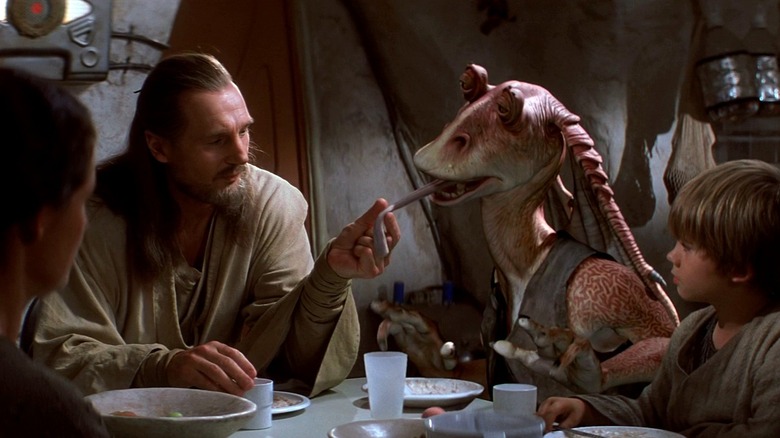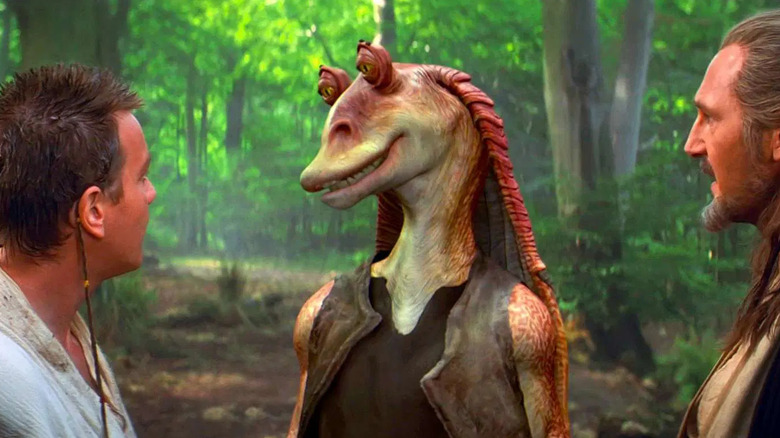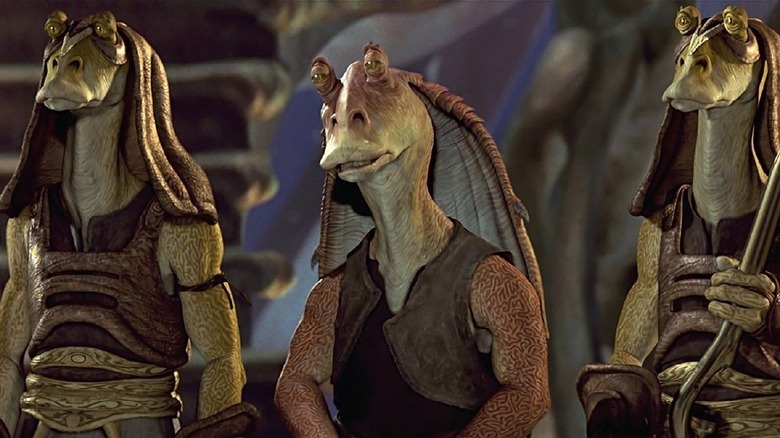Liam Neeson Thought Ahmed Best's Star Wars Performance Would Make Him The New Eddie Murphy
The critical evolution of George Lucas' 1999 film "Star Wars: Episode I – The Phantom Menace" has been fascinating to behold. To this author's memory, no film — not even "Avengers: Endgame" — was more feverishly anticipated. The advertising machine kicked into overdrive. Using 1999-era dial-up internet, "Star Wars" enthusiasts would spend all day downloading the film's trailer, watching it at home, combing it for details, all before such activities became common hobbies and online cottage industries. Lucas' film may be seen as a fulcrum in geek culture. Fandom wouldn't be the same after. Fans camped outside of theaters for weeks, eschewing both work and bathing, hoping to be the first to get tickets. "The Phantom Menace" may have been the first instance of customers buying many tickets at one time, committing to seeing the film multiple times before they had even seen it once.
Then they saw it once.
It took a short span for the anticipation to wear off, but a curious cooling surrounded "The Phantom Menace" immediately after its release. For several months, "The Phantom Menace" was, it seemed, the most incredible film ever committed to celluloid. Then a new consensus began to form. This film, fans began to acknowledge, is bad. The highs of the hype crashed into the ground of disappointment, and "Phantom Menace" transformed into a grand piece of epic cinema into perhaps the worst thing imaginable.
Cited most often in negative reviews was the film's insistent inclusion of the comedy sidekick character Jar Jar Binks, a CGI humanoid alien voiced by actor Ahmed Best. People hated Jar Jar. Hated him. HATED him. But one of the film's stars thought the role would lead to great things for Best. Oh, how wrong they were.
The Jar Jar problem
Critics had very scathing thigs to say about Jar Jar, feeling that the character was not only an irritating comedic presence in a "Star Wars" movies, but that his accent and movements matched those of racist minstrel shows from decades previous.
CNN polled theatergoers at the time, confirming that many loathed the character. The Los Angeles Times published an article shortly after the film's release containing an open acknowledgement from the filmmakers that Jar Jar was annoying, after they had already acknowledged the film's many racist caricatures. John Sutherland in The Guardian bluntly noted the character as a hurtful stereotype, saying that "As critics point out, the 'bungling Gungan' is pure Stepin Fetchit or Jack Benny's black servant, Rochester ('Yaas, Boss')." The character's voice was even mocked in "South Park: Bigger, Longer & Uncut," which came out a mere 42 days later.
For years, audience's vitriol for Jar Jar only increased, and Best became the brunt of a good deal of ire. Best has been candid about the damaging effects toxic fandom had on his psyche, and he laid out his struggles in a 2019 interview with IndieWire, saying that he was driven to depression and suicidal thoughts.
Of course, during production on "The Phantom Menace," no one could have predicted the negative reaction Jar Jar would elicit from critics and fans alike. Lucas thought the character was funny. Best did, too. In a 2020 interview with NME, even Liam Neeson, who plays the stoic Jedi sage Qui-Gon Jinn in the film, admitted that not only was Jar Jar funny, but that Best had a booming career ahead of him. Best, Neeson felt, gave off a good deal of comedic energy similar to that of Eddie Murphy.
Let's just laugh
Indeed, Neeson had no critical words about his co-star, and he wanted to redress the many grievances aimed at the character. Jar Jar, he seemingly felt, made for a fine balance for the otherwise po-faced characters that pepper "The Phantom Menace." He was certainly the funniest character in the film, a quality Neeson admired. The "Taken" star believed, and I think many agree, that Best received far, far too much vitriol:
"He came into a lot of criticism, I mean to the point where it really hurt his career. And I have to say when I was making that film... he was probably one of the funniest guys and talented guys I have ever worked with. I remember calling my old agent, and I said 'Listen, I think I've just worked with the new Eddie Murphy.' And I still believe that ... he had all of us in stitches laughing. Including George Lucas."
Reaction to Jar Jar was so negative that the character's role was reduced in future installments. By "Star Wars: Episode III," Binks' appearance was reduced to a mere cameo, albeit a pivotal one that would eventually bring about the rise of the Empire, citing many to believe that the character may be a Sith lord. Eventually, Best came to embrace Jar Jar's hated position in popular culture, voicing Jar Jar in numerous "Star Wars" parodies, but it took years of unduly born hatred.
Of course, Best isn't the only "Star Wars" actor to have been targeted by fans and critics. As previously written about in /Film, the world owes Jake Lloyd, the child actor who played the young Anakin Skywalker, a massive apology. Additionally, Kelly Marie Tran, who played the plucky engineer Rose Tico in "Star Wars: The Last Jedi," was infamously bullied off of social media.
Fans may have been poorly behaved in the past, but "The Phantom Menace" brought out the worst in everyone.


